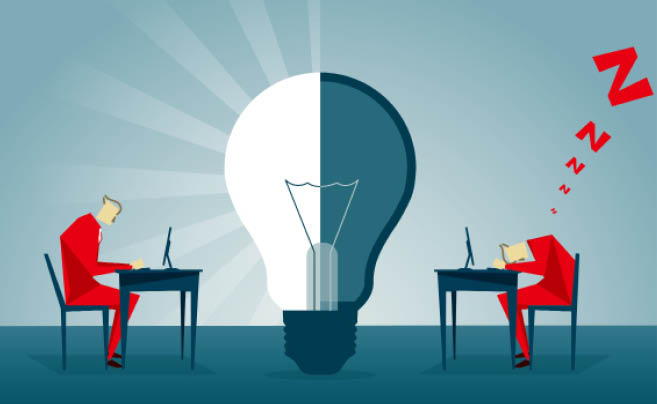Sleep is the new frontier in the war for talent.
Industry leaders used to consider inadequate sleep as a badge of honour. Today the impact of sleep on performance has finally found its way into the boardroom.
Successful employees are learning that they are more creative thinkers and better leaders when they can achieve their required 7-to -8 hours of sleep per night. Bragging about lack of sleep, or long work hours is no longer idealised by performance experts.
Lose two hours sleep per night over four consecutive nights and you will be turning up for work with a cognitive deficit equal to a blood alcohol level of 0.08. You wouldn’t be allowed to drive in that condition.
Successful CEOs are leading the charge by setting boundaries to safeguard their sleep. They’re creating cultures to support great sleep habits. They’re even incentivising the habit as a high performance measure of success and wellbeing.
Research conducted by the University of Washington’s Christopher Barnes and his colleagues demonstrates that leaders are less charismatic and inspiring when they have inadequate sleep. Similarly, employees lacking sleep are less likely to be inspired.
Other research tells us that sleep deprivation leads to individuals being more likely to:
- Display unethical behaviour;
- Report lower levels of work engagement;
- Be involved in more accidents;
- Demonstrate lower levels of cooperation; and
- Exhibit higher levels of selfishness.
Focusing on organisational sleep health produces more creative, ethical, cooperative, safe and engaged workers.
Use sleep as a strategy to achieve greater results in 4 ways:
1. Role model good habits
Commit to the development of habits and routines to ensure you get at least 7 hours of sleep per night. Develop a meditation practice, buy specific clothes for bedtime and develop your own personal routines to help you power down at night.
Try these sleep habits:
- Turn off your screens at least 1 hour before bed;
- Get regular exercise (but not directly before bed);
- Don’t ingest caffeine or other stimulants after 2 pm each day; and
- Stop drinking alcohol up to an hour before bed.
2. Incentivise sleep
Mark Bertolini, CEO of US Health insurance company Aetna, pays employees US$25 per day when they record seven hours sleep over 20 consecutive days’ sleep via their Fitbits.
The initiative encourages the development of good sleep habits, and has helped the company increase employee productivity by 69 minutes per worker, each month. Sleep bonus payments are capped at $500 annually per employee.
3. Provide the right environment
Create a culture that encourages employees to operate at their optimal level of performance. Try Ryan Holmes, CEO of Hootsuite’s approach. He provides nap rooms for staff and encourages them to take 10-20 minute snoozes to re-energize during the workday.
Allow workers the flexibility to balance their personal commitments, sleep requirements and performance results. Provide flexible start times, reduced rosters, work from home policies and differing break arrangements. With the various pressures and responsibilities employees face, having the support to manage their personal life, including their need for adequate rest leads to greater engagement, initiative and innovation.
4. Provide productivity training
Inevitably, workers lose sleep, or steal sleep from themselves due to poor working habits during the day. Teach employees how to create gains in efficiency and effectiveness and they’ll achieve greater results in fewer hours, allowing them the time they need for their personal lives and downtime.
- Encourage your team to be more productive and have more downtime:
- Create a ‘no email after hours’ rule within your team;
- Provide communication guidelines to balance out the impacts of after-hours emails and calls for employees with global responsibilities;
- Provide training for employees to help them understand the importance of exercise, healthy eating and sleep; and
- Teach employees mindfulness techniques to help them manage anxiety and stress.
- Are you and your team members getting enough sleep?
- Remember, it’s a differentiator.







